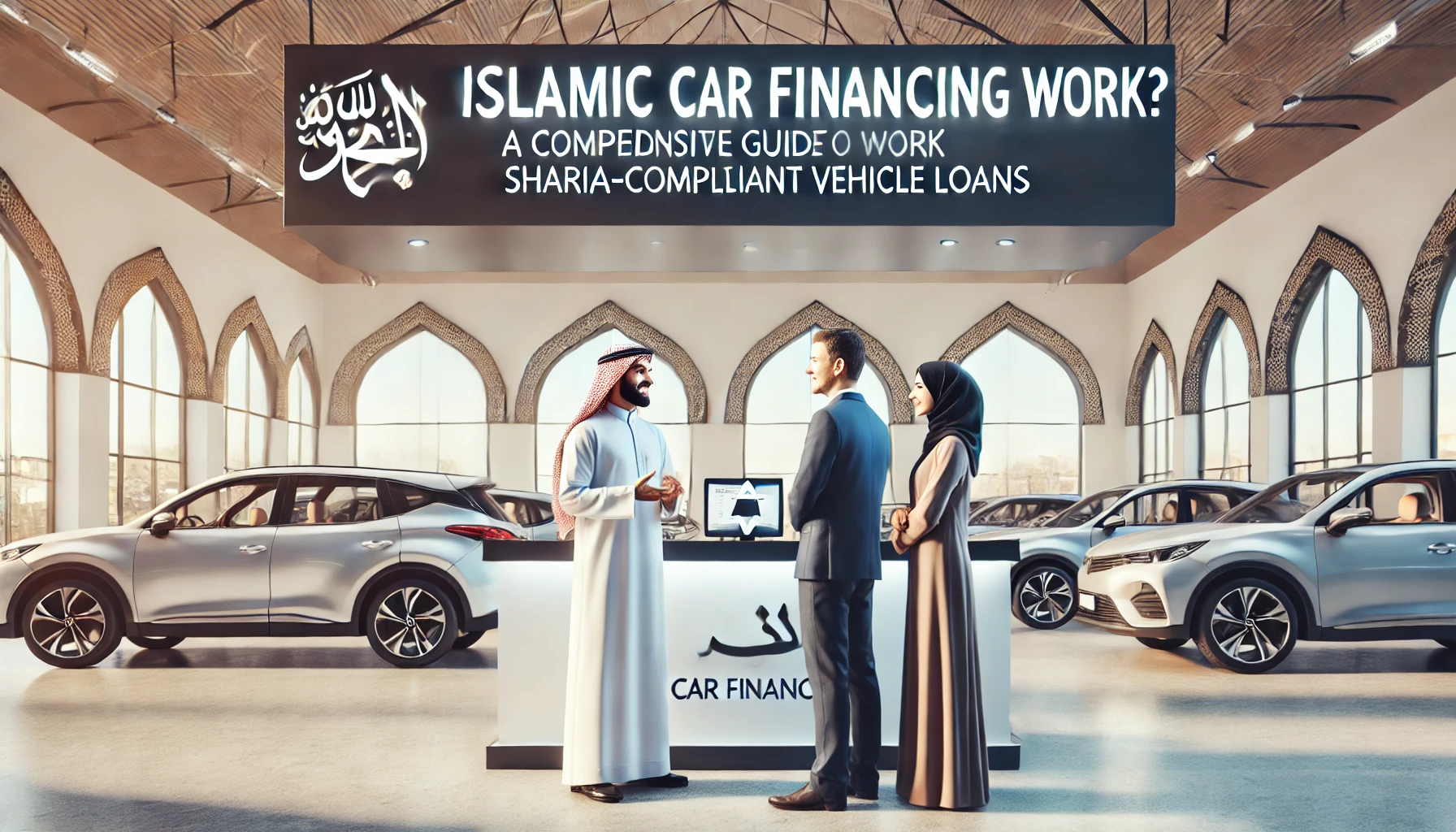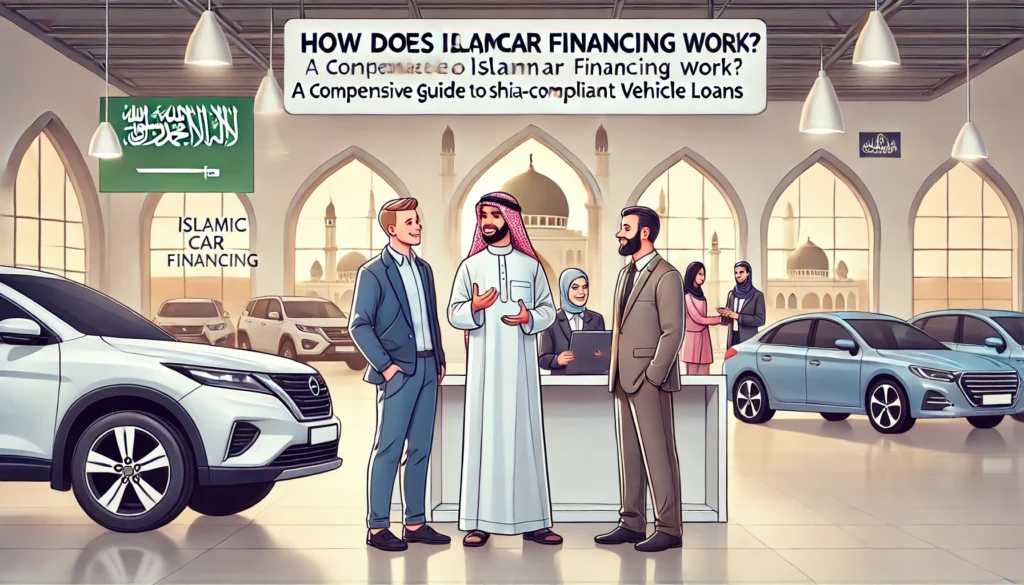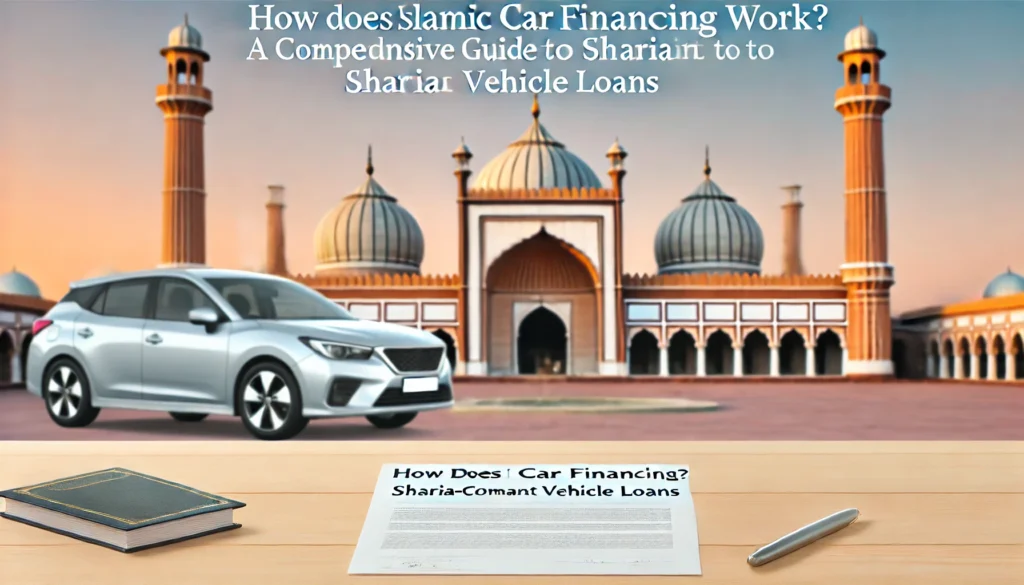Contents
- 1 Introduction to How Does Islamic Car Financing Work
- 2 What is Islamic Car Financing?
- 3 Key Principles of Islamic Car Financing
- 4 Types of Islamic Car Financing
- 5 How Does Islamic Car Financing Compare to Conventional Car Loans?
- 6 Conclusion How Does Islamic Car Financing Work?
- 7 Frequently Asked Questions (FAQs) About How Does Islamic Car Financing Work
Discover how Islamic car financing works, including interest-free loans, Sharia-compliant models like Murabaha and Ijarah, and their benefits. Learn how to finance your car ethically with Islamic vehicle loans.
Introduction to How Does Islamic Car Financing Work
When it comes to financing a car, many people are unaware that Islamic law, known as Sharia, provides a different approach compared to conventional loans. Islamic car financing offers an alternative that complies with the principles of Islamic finance, which prohibits the charging or paying of interest (riba). If you’re looking to purchase a car but want to ensure your financing aligns with your Islamic values, this article will explain how Islamic car financing works, the key principles behind it, and the benefits it offers.
In this guide, we will break down the various types of Islamic car financing available, how they operate, and why they are gaining popularity in Muslim-majority countries and beyond. Whether you’re interested in Murabaha, Ijarah, or Musharakah, we will cover everything you need to know about Sharia-compliant vehicle loans.
What is Islamic Car Financing?
Islamic car financing refers to a system of financing that adheres to the principles of Islamic law (Sharia). Unlike conventional loans, Islamic finance does not involve charging or paying interest, which is prohibited in Islam. Instead, Islamic financing structures are based on ethical and risk-sharing principles that ensure both the lender and borrower share in the transaction’s profits and losses.
The key principles of Islamic car financing focus on justice, transparency, and avoiding any form of exploitation. Islamic financial institutions that offer car loans operate in a way that aligns with these ethical values, making it an attractive option for Muslims seeking Sharia-compliant solutions to their financing needs.
RELATED: Halal Car Finance: A Comprehensive Guide to Ethical Vehicle Financing
Key Principles of Islamic Car Financing
Before diving into how Islamic car financing works, it’s important to understand the key principles behind it:
- Prohibition of Interest (Riba)
The most fundamental principle of Islamic finance is the prohibition of interest (riba). Charging interest on loans is considered exploitative in Islam, and thus, any form of interest is not allowed. In the case of car financing, this means that the financial institution does not charge interest on the loan amount.
- Profit and Loss Sharing
Islamic financing is based on the concept of risk-sharing, which means that both the lender and the borrower share in the profits and losses of the transaction. This contrasts with conventional loans, where the lender receives a fixed return, regardless of the outcome of the transaction.
- Ethical Investments
Islamic finance encourages ethical investments, meaning that funds should not be invested in industries or businesses that are considered harmful or unethical, such as alcohol, gambling, or tobacco. Islamic car financing ensures that the car financing process adheres to these principles, ensuring the borrower’s money is used in an ethical manner.
- Asset-Backed Transactions
In Islamic finance, all transactions must be backed by tangible assets. This means that a car loan is not merely a financial agreement, but a transaction where the car itself serves as the collateral. This ensures that both parties have an interest in the success of the transaction.
Types of Islamic Car Financing
There are several types of Sharia-compliant car financing options that follow different structures. Here are the most commonly used models:
- Murabaha Financing
One of the most common forms of Islamic car financing is Murabaha. In a Murabaha contract, the financial institution purchases the car on behalf of the customer and then sells it to the customer at a marked-up price, which includes the cost and a profit margin.
- How It Works: The customer agrees to purchase the car at the marked-up price, which is paid either in installments or as a lump sum. The price is fixed upfront, and there is no interest involved.
- Key Feature: The customer knows the exact amount to be paid and the financial institution makes its profit from the markup, not from interest.
Benefits of Murabaha:
- Clear, fixed pricing
- No interest payments
- Easy to understand and transparent
- Ijarah Financing
Ijarah is similar to a lease agreement, where the bank or financial institution purchases the car and rents it to the customer. The customer pays regular rental payments for the use of the car, and at the end of the lease term, the customer may have the option to buy the car.
- How It Works: In this model, the customer effectively rents the car from the bank, and the rental payments cover the car’s use. There may be an option to purchase the car at the end of the lease.
- Key Feature: The car ownership remains with the bank or financial institution during the lease period.
Benefits of Ijarah:
- Flexible payment terms
- Potential to own the car at the end of the lease
- No interest charges
- Musharakah Mutanaqisah (Diminishing Partnership)
Another popular model is Musharakah Mutanaqisah, which is a partnership-based financing arrangement. This structure is commonly used for asset financing, including cars.
- How It Works: The bank and the customer enter into a partnership where both contribute to the purchase of the car. Over time, the customer gradually buys out the bank’s share in the car until they fully own it. The customer makes periodic payments that include both the rent for using the bank’s share and the purchase of the bank’s stake in the car.
- Key Feature: The ownership of the car is transferred gradually as the customer buys out the bank’s share.
Benefits of Musharakah Mutanaqisah:
- The customer progressively owns the car
- Flexibility in repayment
- Ethical and transparent
How Does Islamic Car Financing Compare to Conventional Car Loans?
While both Islamic and conventional car loans offer ways to purchase a car, there are key differences that set Islamic financing apart. Below is a comparison of the two:
| Feature | Islamic Car Financing | Conventional Car Loans |
| Interest Charges | No interest (riba) involved | Interest is charged on the loan amount |
| Ownership | The bank or financial institution may retain ownership until paid off (in the case of Ijarah) | The borrower owns the car from the beginning |
| Payment Terms | Fixed payments, but based on profit margins or rent | Payments based on loan terms with added interest |
| Compliance with Sharia | Fully compliant with Islamic principles | Not compliant with Sharia laws |
| Transparency | High transparency with no hidden fees | Potential for hidden fees or complex terms |
Is Islamic Car Financing Right for You?
Deciding whether Islamic car financing is the right choice for you depends on your values, financial situation, and long-term goals. If you are a Muslim who wants to ensure that your financing options comply with Sharia principles, Islamic car financing can provide a great alternative to conventional loans.
It’s also worth noting that Islamic financing institutions often offer competitive terms, and many have a strong focus on customer service. As Islamic finance grows in popularity worldwide, more and more financial institutions are offering a variety of Sharia-compliant financing options, making it easier for consumers to find the right solution.
Conclusion How Does Islamic Car Financing Work?
Islamic car financing offers a unique and ethical approach to vehicle financing that aligns with Islamic principles. By focusing on interest-free transactions, profit-sharing, and asset-backed agreements, it offers an alternative to conventional car loans that is both transparent and Sharia-compliant. Whether you choose a Murabaha, Ijarah, or Musharakah Mutanaqisah model, each offers a way for you to finance a car without violating your religious principles.
Before deciding on Islamic car financing, it’s important to thoroughly research the different options and choose one that fits your financial needs and goals. With the rise of Islamic finance globally, there are plenty of resources and institutions available to help guide you through the process.
By understanding how Islamic car financing works and its ethical, interest-free principles, you can make an informed decision that aligns with both your financial and moral compass.
Frequently Asked Questions (FAQs) About How Does Islamic Car Financing Work
Q1. What is Islamic car financing?
Islamic car financing refers to financial solutions that comply with Sharia law (Islamic principles), offering interest-free car loans. Unlike conventional loans, which charge interest (riba), Islamic car financing avoids interest payments and is structured around ethical, transparent, and asset-backed transactions. In this system, the financial institution may buy the car on behalf of the borrower, then sell it at a profit margin (Murabaha) or lease it with the possibility of purchase (Ijarah). The goal is to ensure fairness and shared risk between the lender and borrower.
Q2. How does Islamic car financing work?
Islamic car financing operates through several Sharia-compliant models, the most common being Murabaha, Ijarah, and Musharakah Mutanaqisah. In Murabaha financing, the bank buys the car and sells it to the borrower at a marked-up price. Ijarah is a lease-to-own model where the customer rents the car from the bank, and Musharakah Mutanaqisah involves a partnership where both parties contribute to the car’s cost, with the borrower gradually buying out the bank’s share. All these options ensure interest-free car loans and comply with Islamic finance principles.
Q3. Is Islamic car financing a good option?
For Muslims seeking to align their financial activities with their religious beliefs, Islamic car financing is an ideal option. Unlike conventional loans that charge interest, which is prohibited in Islam, Sharia-compliant vehicle loans offer a way to purchase a car without violating Islamic principles. Furthermore, Islamic financing is built on fairness and transparency, which can provide peace of mind to borrowers. Whether you opt for Murabaha, Ijarah, or Musharakah, Islamic car financing ensures ethical and risk-sharing practices.
Q4. What are the types of Islamic car financing?
There are three main types of Islamic car financing:
- Murabaha: The bank purchases the car and sells it to the customer at a fixed markup.
- Ijarah: A lease-to-own arrangement where the bank rents the car to the customer, with the option to purchase it at the end of the lease.
- Musharakah Mutanaqisah: A diminishing partnership model where the bank and the customer share ownership of the car, and the customer gradually buys the bank’s share.
Each of these models adheres to Sharia law, ensuring that no interest is charged and that both parties share in the risks and rewards of the transaction.
Q5. How is Islamic car financing different from conventional car loans?
The primary difference between Islamic car financing and conventional car loans lies in the handling of interest. Islamic finance strictly prohibits riba (interest), which means that instead of charging interest, financial institutions offer products based on profit-sharing, leasing, or partnerships. In contrast, conventional loans involve paying interest on the amount borrowed, which can be exploitative. Additionally, Islamic financing is asset-backed, meaning that the car itself serves as collateral, providing security for both the borrower and lender.
Q6. What are the benefits of Islamic car financing?
Islamic car financing offers numerous benefits:
- Interest-Free: As riba is prohibited in Islam, there are no interest payments involved, making it more affordable for borrowers.
- Ethical and Transparent: Islamic finance is built on fairness, risk-sharing, and transparency, which eliminates hidden fees and ensures that both parties are aware of the terms upfront.
- Compliance with Sharia Law: For Muslims, Islamic car financing provides a way to finance a car in accordance with Islamic finance principles.
- Asset-Backed: Since the financing is based on tangible assets, it provides security for both the borrower and the lender.
- Flexible Terms: Models like Ijarah offer flexibility with leasing terms, and Musharakah Mutanaqisah allows the customer to gradually own the vehicle.
Q7. Is Islamic car financing available worldwide?
Yes, Islamic car financing is increasingly available worldwide, particularly in Muslim-majority countries. As Islamic finance grows in popularity, many financial institutions in non-Muslim-majority countries are also offering Sharia-compliant vehicle loans. In countries such as Malaysia, the UAE, Saudi Arabia, and Indonesia, Islamic car financing is widely used. Many global banks have also introduced Islamic finance products to cater to the needs of Muslims who wish to comply with Sharia law.
Q8. Can non-Muslims apply for Islamic car financing?
Yes, non-Muslims can apply for Islamic car financing if they are interested in ethical, interest-free financial solutions. The principles of Islamic finance, such as fairness, transparency, and asset-backed transactions, appeal to a broader audience beyond just Muslims. As long as the financing complies with the Sharia law principles, anyone can benefit from the advantages of Islamic vehicle financing.
Q9. How do Islamic banks make a profit on car loans without charging interest?
Instead of charging interest, Islamic banks make a profit by selling the car at a marked-up price (Murabaha), leasing it out to the borrower with a profit margin (Ijarah), or engaging in a diminishing partnership (Musharakah Mutanaqisah). In Murabaha, the markup includes the bank’s profit, which is agreed upon by both parties upfront. In Ijarah, the bank earns rental income from leasing the car, and in Musharakah, the bank earns from its share in the car’s ownership. All these methods comply with Sharia law and avoid riba.
Q10. Can I buy a used car with Islamic financing?
Yes, you can purchase a used car using Islamic car financing as long as the financial institution offering the Sharia-compliant vehicle loan allows it. The financing process for used cars is similar to that for new cars, though some Islamic banks may require that the car is in good condition and has a clear legal title. As with new cars, the financing model will likely be Murabaha, Ijarah, or Musharakah Mutanaqisah, ensuring that the transaction adheres to the principles of Islamic finance.



1 thought on “How Does Islamic Car Financing Work? A Comprehensive Guide to Sharia-Compliant Vehicle Loans”